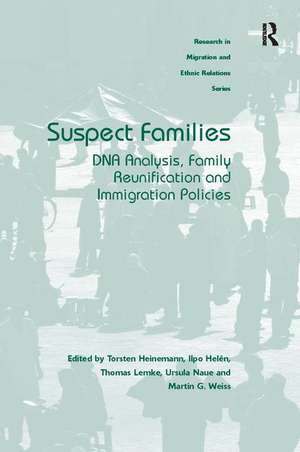Suspect Families: DNA Analysis, Family Reunification and Immigration Policies
Autor Torsten Heinemann, Ilpo Helén, Thomas Lemke, Ursula Naue, Martin Weissen Limba Engleză Paperback – 30 mar 2017
| Toate formatele și edițiile | Preț | Express |
|---|---|---|
| Paperback (1) | 299.52 lei 6-8 săpt. | |
| Taylor & Francis – 30 mar 2017 | 299.52 lei 6-8 săpt. | |
| Hardback (1) | 763.78 lei 6-8 săpt. | |
| Taylor & Francis – 28 feb 2015 | 763.78 lei 6-8 săpt. |
Preț: 299.52 lei
Preț vechi: 341.57 lei
-12% Nou
Puncte Express: 449
Preț estimativ în valută:
57.32€ • 59.62$ • 47.32£
57.32€ • 59.62$ • 47.32£
Carte tipărită la comandă
Livrare economică 15-29 aprilie
Preluare comenzi: 021 569.72.76
Specificații
ISBN-13: 9781138053656
ISBN-10: 1138053651
Pagini: 144
Dimensiuni: 156 x 234 x 13 mm
Greutate: 0.45 kg
Ediția:1
Editura: Taylor & Francis
Colecția Routledge
Locul publicării:Oxford, United Kingdom
ISBN-10: 1138053651
Pagini: 144
Dimensiuni: 156 x 234 x 13 mm
Greutate: 0.45 kg
Ediția:1
Editura: Taylor & Francis
Colecția Routledge
Locul publicării:Oxford, United Kingdom
Notă biografică
Torsten Heinemann is Professor of Sociology with a focus on Social Problems and Social Control in the Faculty of Economics and Social Sciences at the University of Hamburg, and Associate Senior Research Fellow in the Biotechnologies, Nature and Society Research Group in the Faculty of Social Sciences at the Goethe University Frankfurt, Germany. Ilpo Helén is Professor of Sociology in the Department of Social Sciences at the University of Eastern Finland, Joensuu and Kuopio, and a docent of sociology at the University of Helsinki, Finland. Thomas Lemke is Professor of Sociology with a focus on Biotechnologies, Nature and Society in the Faculty of Social Sciences at the Goethe University Frankfurt, Germany. He is the author of Perspectives on Genetic Discrimination, Biopolitics: An Advanced Introduction, and Foucault, Governmentality and Critique, and co-editor of Governmentality: Current Issues and Future Challenges. Ursula Naue is Senior Lecturer in the Department of Political Science at the University of Vienna in Austria. Martin G. Weiss is Assistant Professor in the Department of Philosophy at the University of Klagenfurt, Austria and co-editor of Ethics, Society, Politics.
Cuprins
Chapter 1 Constellations, Complexities and Challenges of Researching DNA Analysis for Family Reunification, Torsten Heinemann, Ilpo Helén, Thomas Lemke, Ursula Naue, Martin G. Weiss; Chapter 2 Germany, Torsten Heinemann, Thomas Lemke; Chapter 3 Finland, Anna-Maria Tapaninen, Ilpo Helén; Chapter 4 Austria, Kevin Hall, Ursula Naue; Chapter 5 Ethical Aspects of DNA Testing for Family Reunification, Martin G. Weiss; Chapter 6 Governing DNA Analysis for Family Reunification, Torsten Heinemann, Ilpo Helén, Thomas Lemke, Ursula Naue, Martin G. Weiss;
Recenzii
'Suspect Families is a timely and thoughtful analysis of the uses of DNA testing in contemporary immigration policy in Europe. The book not only offers a valuable comparative perspective, but also raises serious ethical concerns and theoretical issues about our understanding of identity, family and citizenship. It should be a work of reference for anyone working on these important and fascinating topics.' - Katja Franko Aas, University of Oslo, Norway
'Suspect Families is a much-needed book on the present circumstances of global kinship testing and forms an important empirical base from which we can explore further theoretical and conceptual problems pertaining to the legal, social, cultural and political ramifications of biotechnology on society.' - Sonja van Wichelen, University of Sydney, Australia, The Sociological Review
'Suspect Families is a much-needed book on the present circumstances of global kinship testing and forms an important empirical base from which we can explore further theoretical and conceptual problems pertaining to the legal, social, cultural and political ramifications of biotechnology on society.' - Sonja van Wichelen, University of Sydney, Australia, The Sociological Review
Descriere
This book outlines the European framework of family reunification and the reasons for focussing on Austria, Finland and Germany. It presents the case studies that provide a general understanding of how DNA testing affects the national immigration policies.
